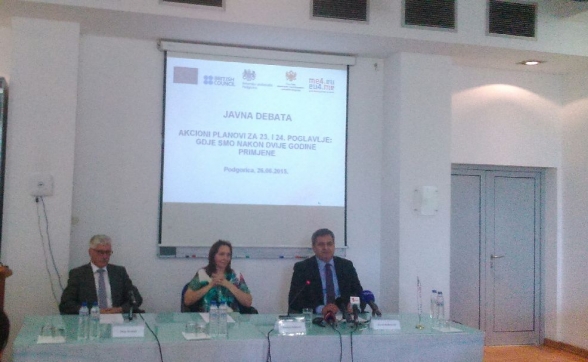To mark the two-year implementation of action plans for Chapters 23 and 24, the Office of the Chief Negotiator for Montenegro’s Accession to EU, in cooperation with the European Union Delegation and British Council, organised a public debate, where the Chairperson of the Committee on European Integration Mr Slaven Radunović was one of keynote speakers.
It was emphasised at the gathering that the negotiations represented joint action of the candidate country and the European Union in finding the most adequate manner for full implementation of legislation, as well as that the key thing for implementation of regulations was to raise awareness of the citizens regarding the need for implementation of the said laws, and that the civil sector played a very important role in that. The participants noted that opening of the chapters represented an administrative act, after which awaited a more important and complex part of the work. It was emphasised that the amendments of the Progress Report signalled that the progress would not only be measured in relation to the previous years, but also in relation to the other candidate countries. Furthermore, it was emphasised that the allocated resources for assistance to Montenegro in this field amounting to a hundred million euros for the period 2014-2020 spoke of the significance that the European Union gave to the rule of law.
In his address to the attendees, Mr Radunović pointed out that the new approach of the European Commission, which entailed opening of the said chapters in the beginning of the negotiations, should be welcomed and used, in the sense of recovery from various anomalies of the society. In that respect, he said that the rule of law should ensure that the citizens have a space of freedom and security, as well as the space of justice in the sense that the citizens have trust in the courts and a sense that their rights would be effectively protected. He added that by adopting a set of laws from the field of judiciary, the normative framework for resolution of the issues included in Chapter 23 was set up, but that the adoption of acts represented only a starting point, because the implementation was key. With regard to the issues covered in Chapter 24, Mr Radunović highlighted the readiness of the country as a key aspect in facing the organised crime groups, and that Montenegro needed to build capacities, so that after joining the EU it could be the “first line of defence” of the EU territory from the cross-border crime, and build protection mechanisms in case of abuse in asylum seeking. He especially emphasised endeavours and commitment of the state administration in the negotiation process, which, in technical terms, responded to complex requirements which were being placed before Montenegro.
In addition to the Chairperson of the Committee, the speakers at the gathering were Negotiator for Chapters 23 and 24 Ms Svetlana Rajković and Head of EU Delegation in Podgorica Mr Mitja Drobnič, while the progress achieved in chapters was presented in two panels, by heads of working groups for Chapters 23 and 24 Ms Branka Lakočević and Ms Mira Cerović,.








